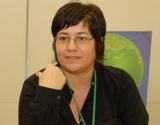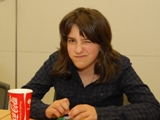2010.10.24
[Interviews]
Competition ŌĆ£ZephyrŌĆØ interview with Belma Bas (director) and Seyma Uzunlar (actress) (10/24)


©2010 TIFF
---Generally, when the conflict between adult and child is portrayed in the film, it is mostly adult-exploits-child relationship. This film is extremely unique and powerful in the sense that the action which the child took driven by her own feelings ended up as a big threat from the adult point of view.
Belma Bas: In the films which depict children, there is often a stereotype of ŌĆśchildren as being pure.ŌĆÖ However, that is not what I think, so I wanted to break away from such clich├®. There are so much storm blowing within children that are already forgotten or have already become something beyond comprehension for grownups. And that is the inner power that children inherently have. Grownups fear this power and thus educate them and try to hold a position of absolute authority in order to suppress the childrenŌĆÖs power. The name ŌĆ£ZephyrŌĆØ means the gentle wind from the west, like the wind that butterflies make when flapping their wings. Even the smallest wind has a big potential. We are losing that innate power through adulthood. You could also take this film as a youth story.

©2010 TIFF
---I hear your film was inspired by your childhood memories of spending some time in the countryside with your grandparents.
Bas: Well, I had never wished to do what the child has done in the film to my own mother (laughs). There were so many similar incidents that kept happening in Turkey that I became interested in this issue. Such cases could be interpreted as actions to become individuals by detaching the connection with the family. In other words, by becoming a different being, you gain a separate self. I wasnŌĆÖt like Zephyr, I had a happy childhood. But on the other hand, I never could feel the emotional detachment with my family. It is indeed necessary to detach yourself in the process of growing up.
---The severity and beauty of the nature is focused throughout the film. In general, when a childŌĆÖs crime is depicted, it often accompanies external factors such as poverty or friends giving bad influences. This derives from the idea that children are inherently pure as you just mentioned. In this film, there seems to be no factor that would give ill effect on Zephyr, and since everything is depicted with the great nature, the childŌĆÖs very last action seems to be strangely convincing.
Bas: I use the phrase, ŌĆśmother natureŌĆÖ metaphorically. There is a threefold theme in this film. The first one is a ŌĆścrimeŌĆÖ, like the one you see in tabloid paper. The second theme is the youth story in which the lead character tears off the navel string that ties oneself with the family and becomes an individual. The third theme is keeping this great nature from being destroyed. This film was taken in the Caucasus region which is the most ecological area in the world. Various kinds of species inhabit the area providing richness in every aspect. Nevertheless, its richness has been destroyed with a terrifying speed by the human activities through construction and years of logging. I really wanted to make it stop by all means. I believe that the children are similar to the nature. The nature can be good or bad. And like the poison mushroom, even fragile and small, it could be very lethal and could take lives.
ŃĆĆŃĆĆ
---Ms. Seyma Uzunlar, were you able to follow ZephyrŌĆÖs behavior without any difficulty? Did you have any trouble in playing the part?
Bas: Let me explain first. I did not give her the whole scenario at the beginning, but gave her the scenario for each scene as it was needed. For the last scene, I did not tell her any particular meaning of her action. This is because I did not want her to get any bad effect from that scene.
Seyma Uzunlar: We often had to work until late at night, and it was tough to wake up early in the morning. The place was on top of the mountain and it was so cold at night.

©2010 TIFF
---How long did it take for shooting the film?
Bas: 7 and half weeks. It rained a lot and the climate was quite bad, so the shooting wasnŌĆÖt easy. And also, all the actors and actresses were amateurs except for the actress playing my mother, and that also prolonged the shooting period.
---Did you go to school during that time, Seyma?
Uzunlar: I knew you asked that question (laughs).
Bas: As a matter of fact, we are relatives, and the place the film was taken at
my parentsŌĆÖ house, and Seyma lives next door. Besides, it was during her summer holidays.
---Could you tell us about your next work?
Bas: I am thinking of making the series. The title of the next film would be ŌĆśHeroineŌĆÖs journey beyond windsŌĆÖ if translated in English. ŌĆ£ZephyrŌĆØ comes from the name of the west wind in Greek myths, and my debut short film is titled ŌĆ£PoyrazŌĆØ which is also the godŌĆÖs name meaning the north wind. The next film is also related to the wind, and is about the solitary mother and a 17-year-old daughter.
’╝łInterviewed by Miyuki Natsume’╝ē
Zephyr

©FiLMiK / FC ISTANBUL, 2010 TURKEY




